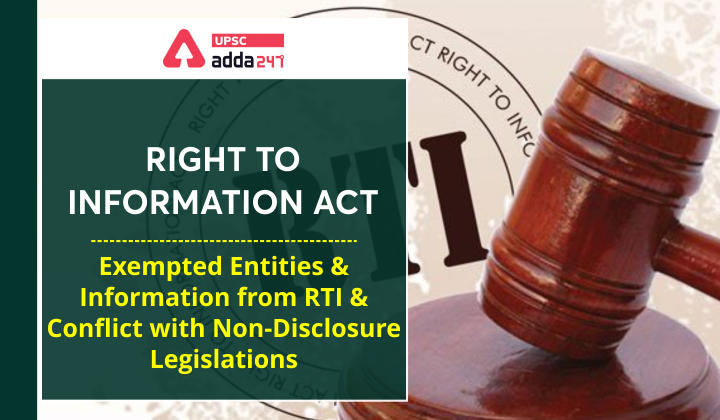Table of Contents
The Right to Information Act- Relevance for UPSC Exam
- GS Paper 2: Important aspects of governance– Citizens charters, transparency & accountability and institutional and other measures.
The Right to Information Act
- The Right to Information Act is a revolutionary Act that aims to promote transparency in government institutions in India.
- The Right to Information Act came into existence in 2005, after sustained efforts of anti-corruption activists.
- We have already discussed the key concept of-
- In this article, we will discuss Information exempted from the RTI Act and its trade-off with various Non-Disclosure Legislations.
Fill this form to get free Study Material of UPSC ESIC Deputy Director
Exempted Departments and Information from RTI
- Exempted Departments: Twenty-odd organizations are exempted from RTI.
- All these entities are related to the country’s defence and intelligence, such as RAW, BSF, CRPF, CISF, Intelligence Bureau, National Security Guard, etc.
- Exempted Information: there are some specific instances whereby RTI information cannot be furnished. For instance, Information that-
- Would affect national security, sovereignty, strategic, economic and/or scientific interest.
- Have been disallowed by the court to be released.
- Have been disallowed by the court to be released.
- Relates to trade secrets or intellectual property, information which might affect/harm the competitive position of a third party.
- Relates to information under fiduciary relationship.
- Relates to foreign government information.
- Would affect the life/physical safety of any person.
- Would affect the process of an investigation.
- Relates to cabinet papers.
- Relates to personal information without any public interest.
- RTI Act also says that any information which cannot be denied to a Member of Parliament or state legislature cannot be denied to any citizen.
Conflict with Non-Disclosure of Information Legislations
- Indian Evidence Act: Some of its provisions (sections 123, 124, and 162) provide power to the concerned authorities to not disclose any information.
- Under these provisions, the head of the department may refuse to provide information on affairs of the state and only swearing that it is a state secret will entitle not to disclose the information.
- In a similar manner, no public officer shall be compelled to disclose communications made to him in official confidence.
- Atomic Energy Act, 1912: It provides that it shall be an offence to disclose information restricted by the Central Government.
- Central Civil Services Act: It provides a government servant not to communicate or part with any official documents except in accordance with a general or special order of government.
- Official Secrets Act, 1923: It provides that any government official can mark a document as confidential so as to prevent its publication.
The Right to Information Act- Recent Amendments and Time Period for Providing Information




 TSPSC Group 1 Question Paper 2024, Downl...
TSPSC Group 1 Question Paper 2024, Downl...
 TSPSC Group 1 Answer key 2024 Out, Downl...
TSPSC Group 1 Answer key 2024 Out, Downl...
 UPSC Prelims 2024 Question Paper, Downlo...
UPSC Prelims 2024 Question Paper, Downlo...




